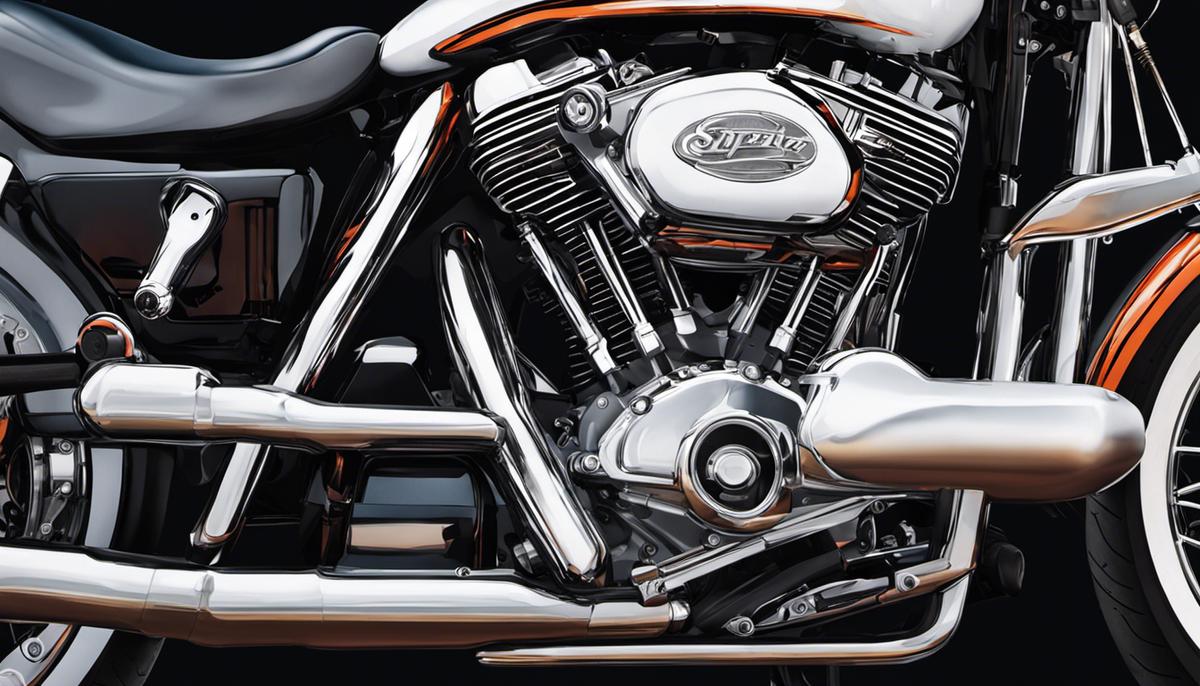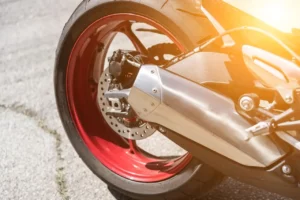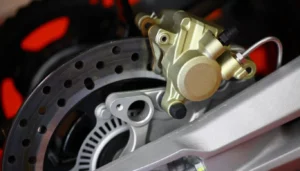As a motorcycle enthusiast or an aspiring rider, there is great pride and convenance to have an inherent knowledge of what lies beneath the hood of your precious ride. Mighty as it seems, the engine can often cause you some unfriendly noises, silently asking for your attention and care. Understanding the core components of a motorcycle engine is not only fascinating but also essential in correctly identifying and rectifying a variety of engine noises.
Reduced to an insignificant hum by some, or amplified to a bothersome drone by others, engine noise can signify anything from a minor hiccough to a major problem in your motorcycle. This guide will delve into the common causes of motorcycle engine noise, introducing troubleshooting techniques to diagnose them effectively, and presenting you with a practical repair and maintenance guide.
You must read: Motorcycle Engine Ticking: 5 Causes With Fixes (Explained)
Role of Motorcycle Engine Components
The exhaust system pipes exhaust used combustion gases from the engine, causing noise if it fails. Cylinder head exhaust port, exhaust manifold, oxygen sensor, catalytic converter, silencer and tailpipe are components. Mufflers are designed to reduce noise, so pay attention.
Combustion Chamber Functionality
The combustion chamber burns air-fuel mixtures to generate power. It has spark plugs, pistons, cylinder heads, and valves. Mechanical issues with these parts may cause knocking or pinging.
Understanding Cylinders in Engines
Cylinders are the power unit in the engines. Engines can have one, two, four, or six cylinders. If you hear a misfire or knocking sound, it can be due to a cylinder malfunction. A common problem is worn-out piston rings – they lead to compression leakage, generating knocking and losing power.
Assessing the Fuel System Components
The fuel system ensures that fuel mixes with air correctly before entering the combustion chamber. Issues with the fuel pump, fuel injectors, and fuel lines might cause engine noise. For instance, a failing fuel pump can cause a loud whining noise.
Checking the Electronics
The electronics in motorcycles control systems such as ignition and fuel injection. An issue in the ignition system can cause misfires, leading to uneven engine sounds. You might also hear clicking or buzzing noises if there’s an issue with your motorcycle’s solenoid or starter relay.
Appreciating the Cooling System
The cooling system controls engine heat. Water pumps, thermostats, radiators, and hoses work. Watch for coolant drops that could indicate a leak. Engine knocking or ticking often results from overheating.
Understanding these components will help you locate engine noise. Check your motorcycle’s manual for specific information about your make and model, as layouts and components vary.
Common Causes of Motorcycle Engine Noise
Loose Parts Resulting in Noise
One common reason behind motorcycle engine noise is loose parts. This can be any part of the bike, but often it involves the exhaust system or engine accessories. These parts can rattle or make a clanging noise, especially when the bike is revving or moving. Regular checks and tightening of these parts will help reduce any unusual sounds.
Low Engine Oil Level – A Common Culprit
Motorcycle engine noise often results from low oil levels. Lubrication reduces friction and smoothes motor operation, preventing a rough ride. Oil checks and changes can prevent this issue and make your bike quieter.
Ignition Knock – An Engine Sound to Watch For
An ignition knock can be another source of motorcycle engine noise. This noise source frequently presents as a knocking or pinging noise and is typically the result of improper ignition spark timing, which causes premature ignition of the air-fuel mixture. It is a matter of serious concern as it can cause considerable damage to your bike’s engine if not dealt with promptly.
Poor Tuning – A Vibrating Motorcycle Engine
Poor tuning of the engine can also cause strange noises. This includes maladjustment of the carburetor leading to an improper mixture of air and fuel. This poor tuning can lead to a rough-running engine that produces excessive noise. Regular servicing of your bike can assist in maintaining appropriately tuned engine components.
Misaligned Valves – A Source of Engine Noise
Lastly, misaligned valves can be a significant factor in motorcycle engine noise. Your bike’s valves need to open and close at correct intervals for the engine to work efficiently. If the valve timing is off, it can result in a noise similar to a ticking or clatter. Valves should be inspected regularly to ensure they are in proper alignment and timing.
Understanding these common causes of motorcycle engine noise and addressing them routinely can assist in maintaining your motorcycle’s engine, leading to a quieter, more comfortable ride.
Troubleshooting Techniques
Step 1: Initial Visual Inspection
The first step in troubleshooting motorcycle engine noise is a thorough visual inspection. Look for any obvious signs of damage to the engine, exhaust system, or framework. Pay particular attention to the areas where the noise seems to be emanating from. Damage such as cracks, breaks, or loose hardware and visible leaks could be the cause of the strange noise.
Step 2: Use an Automotive Stethoscope
An automotive stethoscope can pinpoint the noise source. This tool amplifies engine noise to help you find it. Listen to engine parts with the stethoscope tip. The area that amplifies your noise is likely the problem.
Step 3: Listen for Changes as the Engine Warms up
Not all engine noises are present when the engine is cold. Some only occur once the engine has warmed up. Start your engine and let it run for several minutes while listening for any changes. If the noise becomes louder, or only starts once the engine is warm, this could indicate a problem with your engine’s coolant system, or with one of the engine’s internal components that is coming under stress as it heats up.
Step 4: Evaluate the Noise
Understanding the type of noise can also be helpful to pinpoint the issue. Clicking or ticking noises may indicate valve problems or fuel injector problems. Knocking sound could be from a rod bearing or piston. Pinging or knocking during acceleration might be a sign of bad timing while an exhaust leak might make a chugging noise.
Step 5: Check the Oil and Fluid Levels
Low oil or fluid levels can also cause engine noises, so it’s essential to check these. If your engine oil is low, it could cause a ticking or knocking noise due to inadequate lubrication of the engine components. Low coolant level could cause a gurgling noise.
Step 6: Consult a Professional
If after all these steps you’re still not sure what’s causing your motorcycle engine noise, it may be time to consult a professional mechanic. Sometimes, certain engine problems require advanced tools and know-how to properly diagnose and treat. It’s always better to get a professional opinion than to risk potentially damaging your engine even further.
Repair and Maintenance Guide
Identifying the Source of the Noise
Begin by identifying the source of the bike’s noise. This could stem from the engine, transmission, driveshaft, or other parts. Assessing the noise type can provide hints about its source. Knocking noises could indicate a problem with the engine’s internal components, while grinding noises might signal an issue with the transmission or driveshaft.
Inspecting for Loose Parts
Loose parts can create an array of noises while the motorcycle runs. Before proceeding to complex solutions, check for loose bolts and fasteners. Particular areas to check include the exhaust system, fairings, and engine mounts. Tighten any loose bolts and ensure all components sit securely.
Checking the Oil
A common source of engine noise can be oil-related. A low oil level can cause components to rub against each other, resulting in noise. Regularly check the oil level to prevent this issue. If the oil appears dirty or contaminated, it’s time for a change. Always ensure you have the right amount of oil and it’s of the correct specification for your bike.
Inspecting the Valves
Incorrectly aligned valves can cause ticking or popping noises. Regularly check and adjust the valve clearance. Have a professional do this if you’re uncomfortable with the process. Regular valve adjustments can also help to prolong the bike’s lifespan.
Checking the Transmission
Ticking or grinding noises might indicate a problem in the transmission. Check the bike’s gear and clutch. The transmission’s oil should also be inspected and changed if needed. Loose or worn out gears can cause excess noise and must be repaired or replaced.
Inspecting the Driveshaft
A faulty driveshaft can make clunking or clicking sounds. It could be due to worn-out bearings or damaged U-joints. The driveshaft needs regular lubrication as insufficient lubrication can cause noise. If the issue persists, consider replacing the worn-out parts.
Professional Help
For complex maintenance and repairs, it’s advisable to seek help from a professional mechanic. They’re trained to diagnose, repair, and maintain motorcycles, therefore able to handle complicated problems effectively.
Each motorcycle is unique
and what works for one might not work for another. It’s important to read and understand your motorcycle’s manual to provide quality maintenance specific to your bike. Regular maintenance can reduce the prospects of unwelcome engine noises and extend the lifespan of your bike.
Motorcycle engine noise can often seem intimidating, especially if you’re not well-versed with the machine’s inner workings. However, with an understanding of the various engine components, the common causes of engine noise, the right troubleshooting techniques, and a handy repair and maintenance guide, you would be well equipped to handle and rectify any noise disruptions.
The saying goes, Knowledge is power. Knowing your motorcycle’s engine empowers you as a rider and gives you a closer relationship with it. So, the next time your motorcycle hums that unfamiliar tune, embrace the challenge, get down to troubleshooting, and enjoy the satisfaction that comes from fixing your own machine. Trust yourself; you’ve got this.






